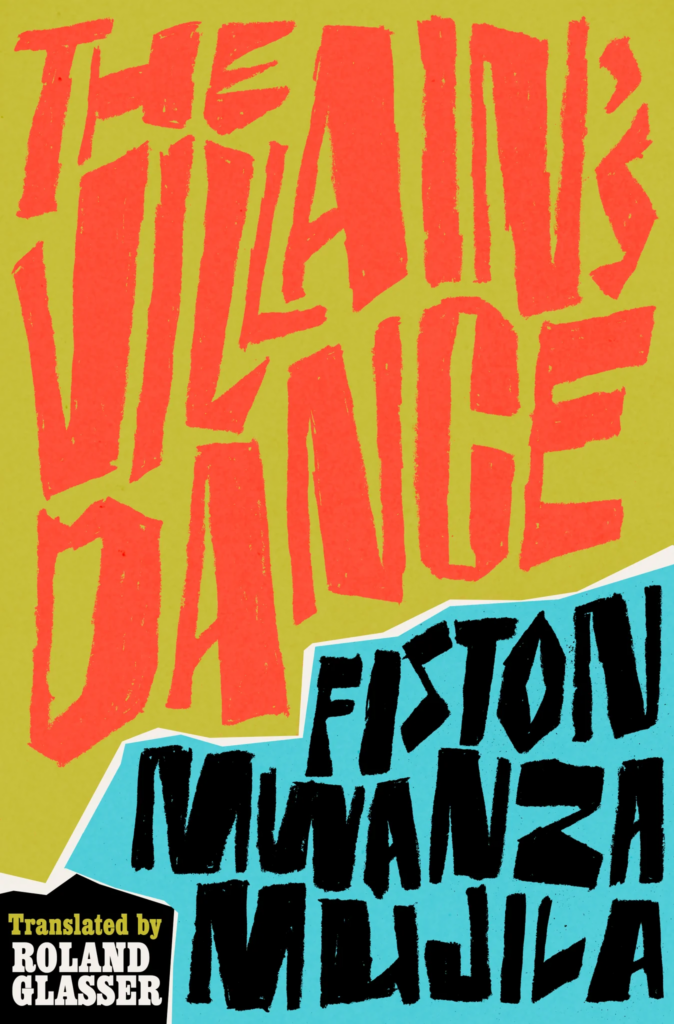
The incendiary and outlandish life of Tshiamuena, nicknamed (posthumously and entirely appropriately) Madonna of the Cafunfo Mines—notwithstanding the jealously of certain diamond panners short on ambition, enthusiasm, and charisma.
The Madonna was not some little madam under the influence of alcohol and other beverages bereft of dosage instructions. She was no prophetess of misfortune and tall tales derived from some unknown gutter. Not even a vendor of dreams, questionable expectations, chimeras . . . well, you’re quite cognizant of where such trinkets lead as they stream into your ears without cease. We were only too familiar with the petulant refrains of those curmudgeons who quibbled over such details. They rehashed the same remarks all day long as if there were fuck all else to do on this earth but poke fun at the Madonna—“Tshiamuena this, Tshiamuena that. Tshiamuena’s got wings, big wings, and as soon as night falls, this witch takes off and flits about for miles and miles without a drop of kerosene, jinxing us from above and sabotaging any chance of finding diamonds in the otherworld.” We’d heard it all! Pointless babbling, rumor-mongering, pure humbuggery; for when it came to Tshiamuena, all ears were pricked; everyone became a scientist, a university professor, a sociologist, a linguist, an ethnologist; each proffered their own two-bit philosophy to dissect her every word and deed. Even the most crestfallen rediscovered a taste for life, the necessary inspiration, the appropriate panache, the smooth words of a politician on the stump. Go hard on the drink if you will, but concocting poppycock just to sink a person (and an authority like the Madonna no less)—that beggars belief. How can people equipped with a cock, a belly, arms, legs, and a brain spend eight hours a day trying to hamstring someone? All the blame for the woes of tropical Africa they laid at her door: miscarriages, failed coups, wars, Emperor Bokassa’s delusions of grandeur . . . They speculated without a break, concocted conspiracy theories, strived to detect relationships of cause and effect between the Madonna (blessed be her memory) and any reversal of fortune that befell the Zairian diaspora. And always (and ever still) those rumors of cannibalism. What a topsy-turvy world! The Madonna, a habitual witch with a fancy for flesh and fresh blood? Even if you detest an individual (for plausible reason) it is still insane to make them carry the can for each cave-in, bout of diarrhea, or act of mischief. They’d not even slept off their beer, polished their teeth, and zipped up their pants than they were opening their gobs to erratically gun down a living legend.
They made you want to puke, the whole greasy lot of them. Weirdest of all was that the scandalmongers proliferated in direct proportion to the quantity of energy and cash Tshiamuena expended in assisting the masses. Without going back as far as the Flood, you could spread gossip and tittle-tattle and tell tall tales, yet the truth would not budge by one iota: Tshiamuena was a grande dame, an exceptional being, a mother to many of us, a queen, a powerful woman. She lacked an opera singer’s figure, a beauty queen’s splendor, or a duchess’ imperial bearing, but she captivated and hypnotized as soon as you met her gaze. Look her straight in the eye and you’d be seized with epilepsy on the spot. We Zairians (mostly born after 1960) would burst into tears as soon as we started to chew the fat with her. When Tshiamuena talked of smuggling in the 1970s, just after Angola’s independence, not one man dared lift his little finger to challenge the veracity of her words. She rattled off entire family trees of the diggers, be they patrocinadors, dona moteurs, lavadors, plongeurs, or karimbeurs. She was not the memory of Angola, she was Angola, the other Angola, the Angola of mines, money, diamonds, cave-ins, the diamantiferous River Kwango; the Angola that any man dreams of at least once in his life (be he a lover of money or not). Tshiamuena was informed of all the rackets going on between Zaire and Angola; she had a detailed knowledge of the Zairians’ comings and goings; she knew when such and such had entered Angola for the first time, which back road they had taken, and what capital they carried in their haversack. In her rare moments of madness (for Tshiamuena did lose her marbles, going by her long tirades and her agitated brow) she enumerated the deceased: long lists of kids, all Zairian, felled in their frantic quest for hasty enrichment by way of someone else’s diamonds—that is to say Angolan stones. Not a hiccough, credulous utterance, or laugh interrupted her narrative flow, even though it was normal in the Cafunfo Mines to come across young Zairians laughing, mouths agape, for no apparent reason. Her beaming features gave everyone the chance to admire her dimples.
Tshiamuena was born to reign. What a woman! Arms raised, as if a rifle were pointed at her, she pontificated in pizzicato, and we, in our tattered rags, as still as salt statues, indifferent to heat or cold, to famine, fatigue, or fear of the next cave-in, we swallowed her reminiscences like bread rolls spread with soya paste. Tshiamuena was raving, but with such nonchalance. Her fantasies, we lapped them up. Toxic and excessive masculinities were crushed in the bud. Her words touched you, plunged down your esophagus, smashed your cerebral system, and you emerged exhausted, truly breathless, as if you’d escaped a nasty pogrom or done a thousand years’ forced labor. Her uncontrolled exhaustions, her nervous breakdowns, her secretions of drool, her vomitings, her momentary losses of speech, of hearing, and of smell too, her tremoring feet and head, and her inopportune drowsiness added grist to the mill of those who accused her of belonging to a sect and sabotaging people’s fortunes, not to mention preventing them from hitting pay dirt without sacrificing a member of their family. Her incantations concluded with sumptuous moments of silence that even the foot soldiers of the UNITA rebellion didn’t dare transgress. This natural silence fell heavier than starved bodies gorged on digging or the despair of returning to Kinshasa empty-handed. The silence, along with her grating voice and the rare assurance with which she recounted her inanities, was the daily fare of those protracted nights deprived of light bulbs, oil lamps, or even the Good Lord himself.
“In the 1970s,” she declared, with a dry throat and an empty gaze like that of the dying or of someone who has lost both parents that very day, “Angola was heaven for audacious and opportunistic Zairians besotted by easy money. Any Zairian from Kinshasa and Kasai old enough to be wed and eat their fill swore only by Angola. The Portuguese colonists had packed up and cleared out in a hurry. Dr Jonas Savimbi’s UNITA and José Eduardo Dos Santos’s MPLA, which had actually fought alongside each other in the war of independence, were embroiled in a rearguard battle for the monopoly of power. At this juncture,” whispered Tshiamuena, with a defeated air and on the verge of tears, “Angola was becoming a colander. Porous borders. A stampede in both directions. Zairians of your age breezed in by the dozens, the hundreds, carrying all sorts of goods. Angola was cut off from the world. And staples such as wax fabrics, cigarettes, beer, transistor radios, tinned foods, rubber boots, sugar, salt, soap, and secondhand clothes were snapped up like you haven’t the slightest idea. We bartered gems for these products thousands of times.”
Tshiamuena was an unparalleled raconteur. She would recap the same tale fifty times. And with each telling, the story took on a different flavor. A living, ancient eyewitness to this golden age (war being the most generous period for doing business: it’s double or nothing, you fill your boots or you lose your money and your skin too), she lamented the fact that some Zairians shamefully stuffed their pockets at Angola’s expense, yet she herself had no shortage of stones about her person. She said that the Angolans were in a far from celebratory mood and consequently did not keep their eyes on the diamonds. They were at each other’s throats while the stones lay idle. Ah, the Madonna! A remarkable woman, Tshiamuena! Any Zairian who had cut their teeth in Angola would have testified for her, even with a gun to their head. The Madonna of the Cafunfo Mines was certainly not of the same flesh as we who strayed for centuries in Angola’s alluvial mines. She was a wonderful person. An oasis in the Kalahari Desert. Drinking water. Mother Earth. Temple Guardian. Railway through the scrubland of our dog-eared dreams. Goddess of Grub. Zaire River in miniature. Architect of our opulent desires. Eldest Daughter of money and abundance. Patron Saint of the Zairian diamond panners of Lunda Norte. Ah, the Madonna! Miles of love in the service of the Zairian diaspora. Take the diplomatic service of the Republic of Zaire in Angola, which was out of action—closed, padlocked, null and void—for reasons of belligerency: the Madonna embodied the Zairian Embassy all on her own.
In that period, a whole swathe of the Angolan provinces (including Cafunfo) found itself under the control of the rebellion, which held the mining concessions in an iron grip. They regulated who entered or exited the mines to the nth degree and earned a few kopecks for each diamond found. The quarries were only accessible at prescribed hours. The diggers needed a permit both to stay in the camps and to enter the mines; without it, they could be harassed to the point of death.
It was amid these vexing circumstances that the Madonna entered the scene. She delivered the captives from the rebels’ clutches; leveraged her contacts, starting with her Angolan husbands in chronological order (Mitterrand, Kiala, Augustino, José), to enable each and every one to come into possession of the proper papers; cared for the sick and those injured in cave-ins; handed out food to the most destitute; and managed to sort out the repatriation of the mortal remains of those whose families couldn’t venture into Angola. The list of her good works is as long as the Zambezi River.
The story went around in Luanda and Lunda Norte that when she was just a slip of a girl she managed to save her parents from an arson attack. Here’s how it goes: the fire blazes through the kitchen and spreads toward her parents’ bedroom. From her crib, the child realizes the danger. She shrieks and somersaults, but her mother and father are in a deep sleep. With superhuman effort, she climbs out of her cot. Here there are two conflicting versions. Either she crawls to her parents’ bedside and, alerted by her screams, they wake. Or—even more fantastical—she remains in her cradle and starts to cry— first teardrops, then tears as vast as the (Zaire) River until they extinguish the flames.
All those who returned from Angola, their pockets empty or brimming with stones, spoke in purring tones when mentioning the Madonna, perhaps to guard against probable sobbing. They were unanimous that the Republic of Zaire should pay Tshiamuena back in her own coin. Render unto Caesar the things which belong to Caesar. Render unto the Madonna of the Cafunfo Mines the things which belong to the Madonna of the Cafunfo Mines. Emotion getting the better of them, they went all in, insisting that Cabu Bridge bear her initials henceforth, that Avenue Saio be rechristened after her, and that on Place Victoire a monument seven meters tall be erected portraying her holding a diamond aloft in her left hand.
__________________________________
Excerpt from The Villain’s Dance by Fiston Mwanza Mujila, translated by Roland Glasser. Published by Deep Vellum Publishing. Copyright © 2020 by Fiston Mwanza Mujila. Translation copyright © 2024 by Roland Glasser.


